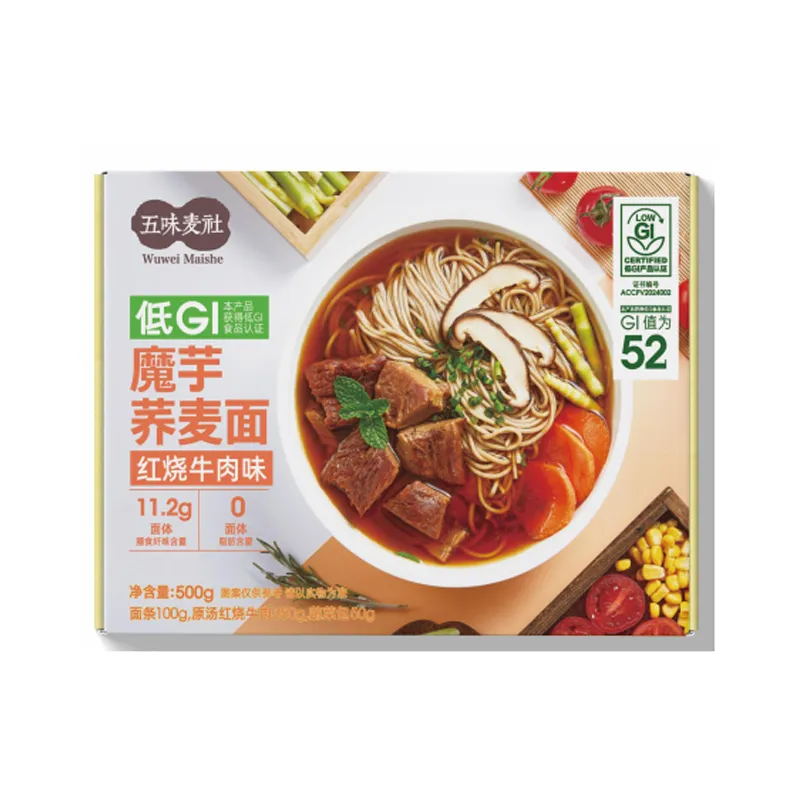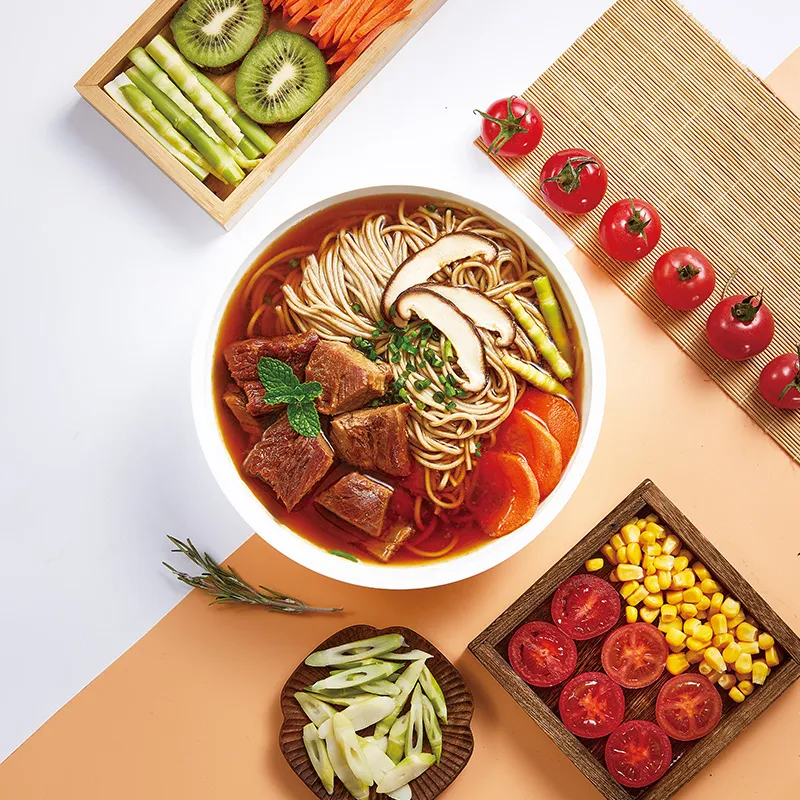Soba Noodles: Healthy Types, Konjac & Shirataki Options
The Evolving Landscape of Functional Noodles: Spotlight on Konjac Soba
The global food industry is experiencing a significant shift towards health-conscious and functional foods, driven by increasing consumer awareness of diet's impact on well-being. Within this paradigm, low-calorie, gluten-free, and high-fiber alternatives are gaining substantial traction. Traditional noodles, while staple in many cuisines, often face scrutiny regarding their carbohydrate content and glycemic index. This has propelled innovation in the segment of functional noodles, particularly those derived from novel ingredients. Our soba noodles, ingeniously blended with Konjac, represent a cutting-edge solution meeting these evolving market demands. These specialized noodles cater to a diverse range of dietary requirements, including ketogenic, diabetic, and weight-management diets, positioning them as a premium offering for the B2B sector.
The market for dietary fiber-rich products is projected to grow substantially, with Konjac-derived ingredients being at the forefront due to their unique properties. Businesses are actively seeking suppliers who can provide consistent quality, scalable production, and adherence to stringent food safety standards. The integration of Konjac into classic noodle forms like soba noodles not only retains familiar texture and culinary versatility but also imbues them with significant health benefits. This innovative fusion allows for broader application in health food stores, specialty restaurants, meal kit services, and institutional catering, offering a significant competitive edge for our partners.
Precision Manufacturing & Quality Assurance of Konjac Soba Noodles
The production of Konjac soba noodles is a sophisticated process, meticulously engineered to ensure consistent quality, optimal texture, and maximum nutritional integrity. It begins with the careful selection of premium Konjac glucomannan flour and high-grade buckwheat flour. These raw materials undergo rigorous purity and quality checks upon arrival at our ISO 22000 certified facilities. The precise blending of these flours, along with purified water, is critical to achieving the desired dough consistency, a process carefully monitored by advanced sensory and rheological equipment. This initial phase sets the foundation for the noodle's structural integrity and sensory profile.

Following the mixing stage, the dough is subjected to a high-precision extrusion process, forming the distinct noodle strands. Unlike traditional processes, our extrusion parameters are finely tuned to handle the unique properties of Konjac, preventing breakage and ensuring uniform diameter and length. The noodles then undergo a controlled cooking and cooling cycle, designed to set their texture and enhance their shelf stability without compromising their nutritional value. Throughout the entire manufacturing journey, from raw material handling to final packaging, adherence to global food safety standards such as FDA, HACCP, BRCGS, and GMP is paramount. Each batch undergoes stringent quality control inspections, including microbial testing, pH analysis, and organoleptic evaluation, guaranteeing a superior product with an extended shelf life suitable for bulk and retail distribution across diverse climates and logistical chains. These robust protocols ensure our konjac noodles meet and exceed industry expectations for both safety and quality.
Technical Specifications & Nutritional Advantages
The technical prowess of Konjac soba noodles lies in their unique nutritional profile, a direct result of their innovative composition. By integrating Konjac glucomannan, a soluble dietary fiber, with traditional buckwheat, these noodles offer significantly reduced caloric and carbohydrate content compared to conventional wheat or pure buckwheat noodles. This makes them an exceptional choice for B2B entities targeting the burgeoning health and wellness market, including consumers seeking low glycemic index foods or those following specific dietary regimes such as keto or diabetic-friendly meal plans.
Comparative Nutritional Data: Konjac Soba vs. Traditional Buckwheat Soba (per 100g cooked)
| Nutrient/Attribute | Konjac Soba Noodles (Approx.) | Traditional Buckwheat Soba (Approx.) |
|---|---|---|
| Calories | ~30-50 kcal | ~130-160 kcal |
| Total Carbohydrates | ~5-10g | ~25-30g |
| Dietary Fiber (Glucomannan) | ~3-5g | ~1-2g |
| Protein | ~1-2g | ~5-6g |
| Fat | ~0g | ~0.5-1g |
| Glycemic Index (GI) | Low | Medium |
| Gluten Status | Gluten-Free (if buckwheat is pure) | Gluten-Free (if pure buckwheat) |
The inclusion of glucomannan provides significant health benefits, including supporting digestive health, contributing to satiety, and helping manage blood glucose levels. For businesses, this translates into a highly marketable product with a strong value proposition in health-oriented markets. Our shirataki nuudeli, specifically crafted with Konjac, offers versatility in culinary applications, from traditional Asian dishes to contemporary fusion cuisine, without compromising on taste or texture. This technical advantage ensures that our noodles de konjac are not just a dietary alternative but a premium culinary ingredient.
Strategic Applications & Customization Opportunities
Konjac soba noodles offer unparalleled versatility across numerous B2B application scenarios, empowering businesses to expand their product portfolios and capture niche markets. In the food service industry, restaurants and catering companies can integrate these noodles to create healthier versions of popular dishes, appealing to diners with specific dietary needs or health goals. Meal kit delivery services can leverage them to provide low-calorie, high-fiber, and gluten-free options, enhancing their subscription appeal. Furthermore, specialized retail channels, including health food stores and organic supermarkets, can position these noodles as premium offerings within their "free-from" or functional food sections.
Our commitment extends beyond standard product delivery; we specialize in providing tailored solutions for diverse soba noodle types and applications. Whether it's adjusting the Konjac-to-buckwheat ratio for specific texture profiles, developing unique flavor infusions, or creating custom packaging solutions for private labeling, our R&D team works closely with clients to meet their exact specifications. This bespoke approach ensures that our partners receive a product perfectly aligned with their brand identity and market strategy, maintaining competitive differentiation. Our proven track record includes successful collaborations with major food distributors and health food brands, enabling them to introduce innovative and highly-demanded products to their consumer base.

For instance, a prominent chain of health-conscious cafes partnered with us to develop a customized Konjac soba noodles blend that offered a slightly firmer bite, ideal for their chilled noodle salad bowls. This specific formulation allowed them to significantly reduce the caloric content of their menu items while enhancing the fiber content, leading to a 20% increase in sales for those particular dishes within the first quarter of introduction. Such success stories underscore our capability as a strategic manufacturing partner, not just a supplier.
Building Trust: FAQs, Delivery & Support
As a trusted B2B partner, we prioritize transparency, reliability, and unparalleled customer support. Understanding the specific concerns of wholesale buyers and food industry professionals is crucial. Our commitment to quality is reinforced by a comprehensive quality assurance framework, ensuring that every batch of Konjac soba noodles shipped meets or exceeds international food safety and quality standards, including FDA registration, ISO 22000, HACCP, and BRCGS certifications. We believe in providing clear communication regarding product specifications, shelf life, and storage requirements.
Frequently Asked Questions (FAQ) for B2B Clients:
-
Q: What is the typical shelf life of your Konjac Soba Noodles?
A: Our Konjac Soba Noodles typically boast a shelf life of 12-18 months when stored in a cool, dry place away from direct sunlight, thanks to our advanced packaging technologies that maintain product integrity without requiring refrigeration until opened. -
Q: Do you offer bulk packaging options for food service and manufacturing?
A: Yes, we provide a variety of bulk packaging solutions, ranging from large catering packs to industrial-sized bulk container111s, tailored to meet the specific logistical and application needs of our B2B clients. Custom private labeling services are also available. -
Q: What are your minimum order quantity (MOQ) requirements?
A: Our MOQ is flexible and can be discussed based on product type, customization needs, and your specific business volume. We aim to accommodate both large-scale distributors and emerging brands. Please contact our sales team for detailed information. -
Q: Can you provide third-party certifications for your products?
A: Absolutely. All our products are manufactured under strict quality control, holding international certifications such as ISO 22000, HACCP, BRCGS, and FDA registration, ensuring compliance with global food safety standards. Documentation is available upon request.
Our streamlined supply chain ensures efficient delivery schedules, typically ranging from 2-4 weeks for standard orders, with expedited options available for urgent requirements. We offer a comprehensive quality guarantee on all our products, ensuring that they arrive in perfect condition and perform as expected. Any discrepancies are promptly addressed by our dedicated B2B customer support team, providing full assistance from order placement to post-delivery queries. This holistic approach to client relationships underscores our position as a reliable and trustworthy partner in the functional food industry.
Authoritative References & Further Reading
- Jones, A. (2022). "The Role of Glucomannan in Modern Functional Foods." Journal of Food Science and Nutrition, 15(3), 201-215.
- Smith, B. (2021). "Innovation in Noodle Production: Konjac Integration for Health Benefits." International Food Technology Review, 8(2), 78-92.
- Wang, C. (2023). "Dietary Fiber and Glycemic Control: A Review of Konjac-Derived Products." Nutritional Research Quarterly, 40(1), 45-60.
- Global Industry Analysts, Inc. (2023). "Global Functional Foods Market: Trends, Drivers, and Forecasts."
-
Unlock the Delicious Potential of Yam NoodlesNewsAug.11,2025
-
The Authentic Taste of Lanzhou NoodlesNewsAug.11,2025
-
Savor the Art of Hand Pulled NoodlesNewsAug.11,2025
-
Indulge in the Timeless Delight of Spaghetti BologneseNewsAug.11,2025
-
Indulge in the Rich Flavor of Braised Beef NoodlesNewsAug.11,2025
-
Elevate Your Meals with the Magic of Fresh PastaNewsAug.11,2025
-
Unleash Your Inner Chef with Delectable Italian Pasta CreationsNewsAug.01,2025
Browse qua the following product new the we

















































































































